Analysis of the Contemporary Hospitality Industry with Accor Hotels
VerifiedAdded on 2023/01/11
|9
|2864
|59
Report
AI Summary
This report provides a comprehensive analysis of the contemporary hospitality industry, using Accor Hotels as a case study. It begins with an introduction to the industry, highlighting its growth and importance, and then delves into the different types of businesses within the sector, including food and beverages, travel and tourism, and lodging. The report explores the operational and functional departments within Accor Hotels, such as human resources, marketing, food production, and housekeeping, and examines their roles in ensuring business success. It then analyzes the contribution of the hospitality industry to local, national, and international economies, emphasizing its role in job creation, investment, and economic development. The report also discusses various operational roles within the hospitality industry, such as front desk officers, housekeepers, and kitchen staff, and identifies the skills required for these roles, including language proficiency, communication, teamwork, and flexibility. Finally, the report examines skill deficiencies within the industry, providing insights into areas where further training and development may be needed.
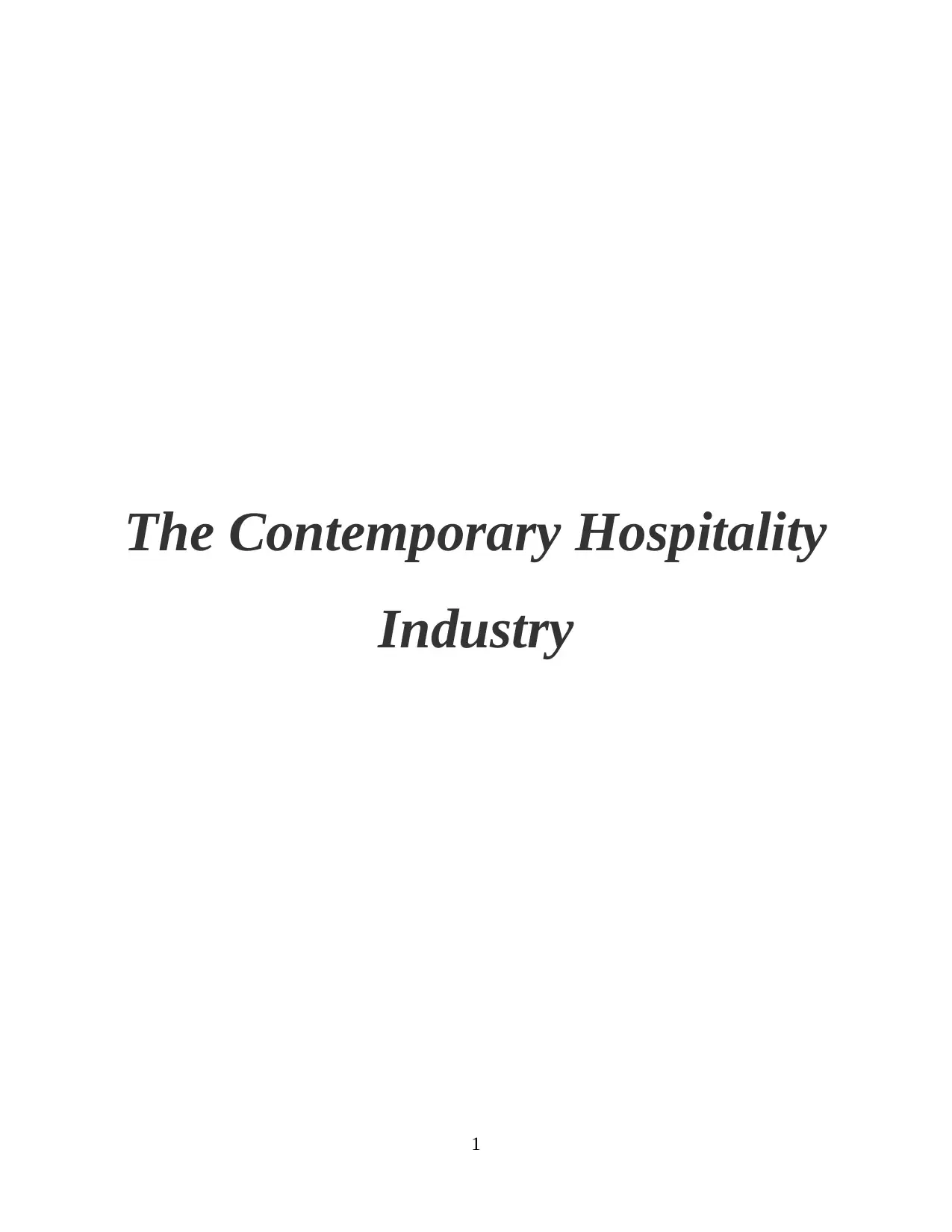
The Contemporary Hospitality
Industry
1
Industry
1
Paraphrase This Document
Need a fresh take? Get an instant paraphrase of this document with our AI Paraphraser
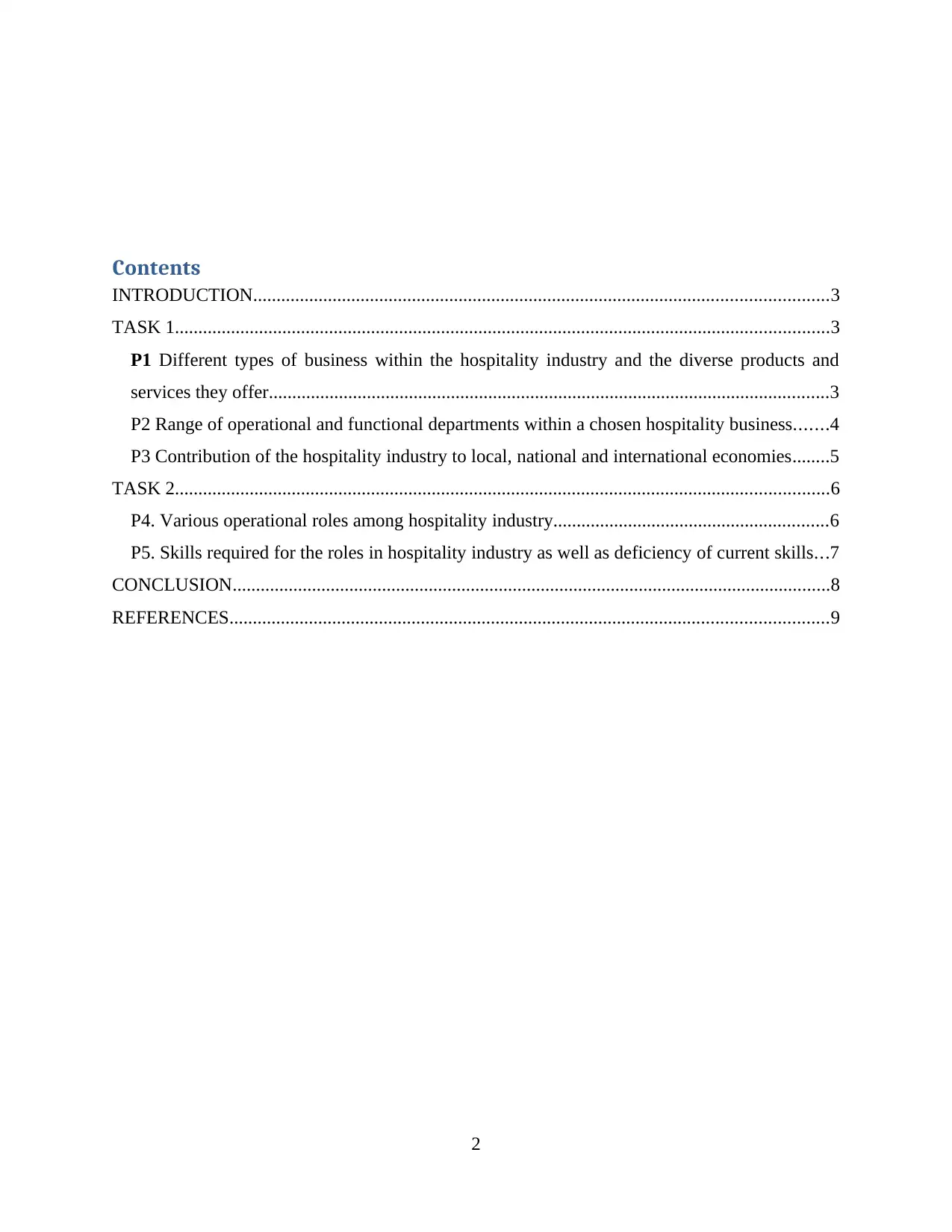
Contents
INTRODUCTION...........................................................................................................................3
TASK 1............................................................................................................................................3
P1 Different types of business within the hospitality industry and the diverse products and
services they offer........................................................................................................................3
P2 Range of operational and functional departments within a chosen hospitality business.......4
P3 Contribution of the hospitality industry to local, national and international economies........5
TASK 2............................................................................................................................................6
P4. Various operational roles among hospitality industry...........................................................6
P5. Skills required for the roles in hospitality industry as well as deficiency of current skills...7
CONCLUSION................................................................................................................................8
REFERENCES................................................................................................................................9
2
INTRODUCTION...........................................................................................................................3
TASK 1............................................................................................................................................3
P1 Different types of business within the hospitality industry and the diverse products and
services they offer........................................................................................................................3
P2 Range of operational and functional departments within a chosen hospitality business.......4
P3 Contribution of the hospitality industry to local, national and international economies........5
TASK 2............................................................................................................................................6
P4. Various operational roles among hospitality industry...........................................................6
P5. Skills required for the roles in hospitality industry as well as deficiency of current skills...7
CONCLUSION................................................................................................................................8
REFERENCES................................................................................................................................9
2
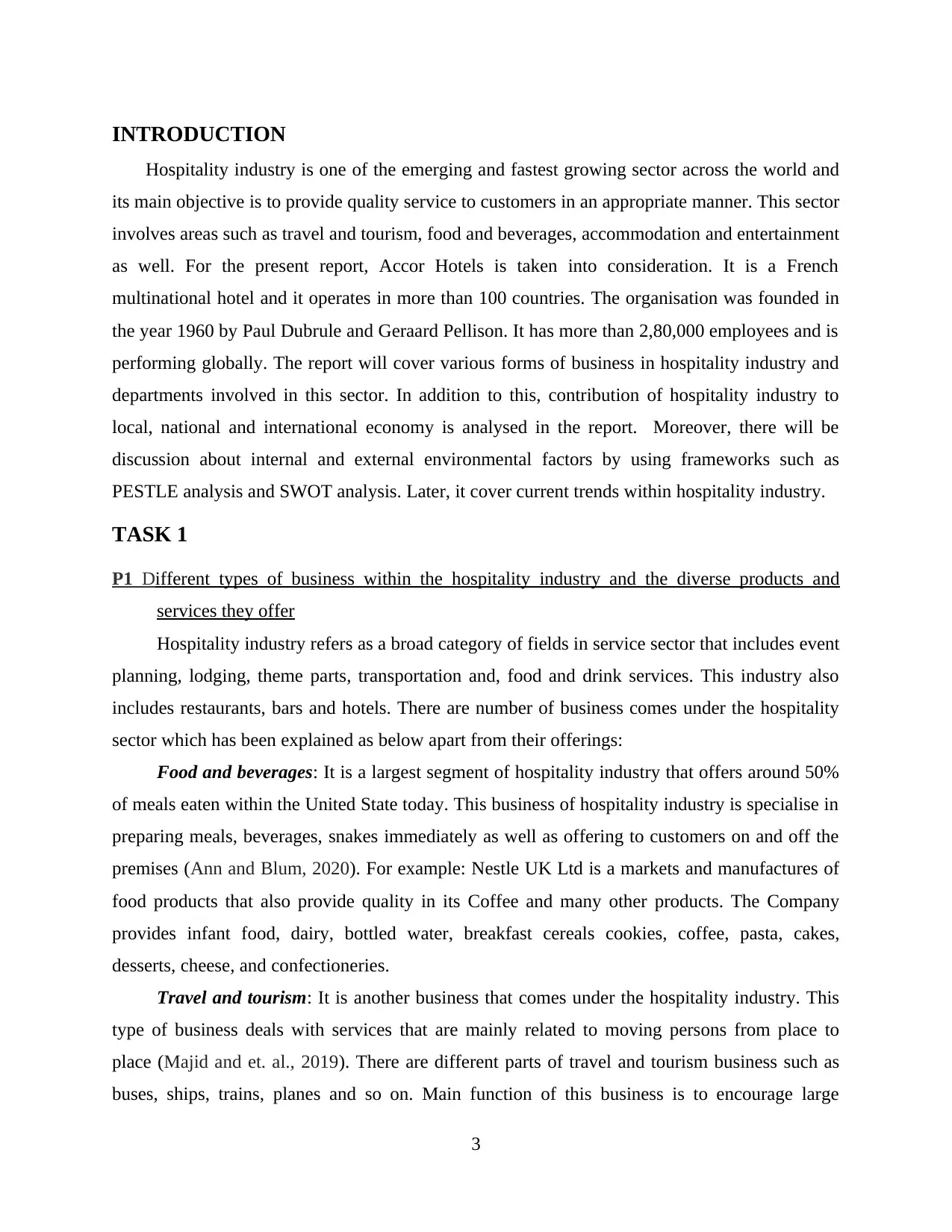
INTRODUCTION
Hospitality industry is one of the emerging and fastest growing sector across the world and
its main objective is to provide quality service to customers in an appropriate manner. This sector
involves areas such as travel and tourism, food and beverages, accommodation and entertainment
as well. For the present report, Accor Hotels is taken into consideration. It is a French
multinational hotel and it operates in more than 100 countries. The organisation was founded in
the year 1960 by Paul Dubrule and Geraard Pellison. It has more than 2,80,000 employees and is
performing globally. The report will cover various forms of business in hospitality industry and
departments involved in this sector. In addition to this, contribution of hospitality industry to
local, national and international economy is analysed in the report. Moreover, there will be
discussion about internal and external environmental factors by using frameworks such as
PESTLE analysis and SWOT analysis. Later, it cover current trends within hospitality industry.
TASK 1
P1 Different types of business within the hospitality industry and the diverse products and
services they offer
Hospitality industry refers as a broad category of fields in service sector that includes event
planning, lodging, theme parts, transportation and, food and drink services. This industry also
includes restaurants, bars and hotels. There are number of business comes under the hospitality
sector which has been explained as below apart from their offerings:
Food and beverages: It is a largest segment of hospitality industry that offers around 50%
of meals eaten within the United State today. This business of hospitality industry is specialise in
preparing meals, beverages, snakes immediately as well as offering to customers on and off the
premises (Ann and Blum, 2020). For example: Nestle UK Ltd is a markets and manufactures of
food products that also provide quality in its Coffee and many other products. The Company
provides infant food, dairy, bottled water, breakfast cereals cookies, coffee, pasta, cakes,
desserts, cheese, and confectioneries.
Travel and tourism: It is another business that comes under the hospitality industry. This
type of business deals with services that are mainly related to moving persons from place to
place (Majid and et. al., 2019). There are different parts of travel and tourism business such as
buses, ships, trains, planes and so on. Main function of this business is to encourage large
3
Hospitality industry is one of the emerging and fastest growing sector across the world and
its main objective is to provide quality service to customers in an appropriate manner. This sector
involves areas such as travel and tourism, food and beverages, accommodation and entertainment
as well. For the present report, Accor Hotels is taken into consideration. It is a French
multinational hotel and it operates in more than 100 countries. The organisation was founded in
the year 1960 by Paul Dubrule and Geraard Pellison. It has more than 2,80,000 employees and is
performing globally. The report will cover various forms of business in hospitality industry and
departments involved in this sector. In addition to this, contribution of hospitality industry to
local, national and international economy is analysed in the report. Moreover, there will be
discussion about internal and external environmental factors by using frameworks such as
PESTLE analysis and SWOT analysis. Later, it cover current trends within hospitality industry.
TASK 1
P1 Different types of business within the hospitality industry and the diverse products and
services they offer
Hospitality industry refers as a broad category of fields in service sector that includes event
planning, lodging, theme parts, transportation and, food and drink services. This industry also
includes restaurants, bars and hotels. There are number of business comes under the hospitality
sector which has been explained as below apart from their offerings:
Food and beverages: It is a largest segment of hospitality industry that offers around 50%
of meals eaten within the United State today. This business of hospitality industry is specialise in
preparing meals, beverages, snakes immediately as well as offering to customers on and off the
premises (Ann and Blum, 2020). For example: Nestle UK Ltd is a markets and manufactures of
food products that also provide quality in its Coffee and many other products. The Company
provides infant food, dairy, bottled water, breakfast cereals cookies, coffee, pasta, cakes,
desserts, cheese, and confectioneries.
Travel and tourism: It is another business that comes under the hospitality industry. This
type of business deals with services that are mainly related to moving persons from place to
place (Majid and et. al., 2019). There are different parts of travel and tourism business such as
buses, ships, trains, planes and so on. Main function of this business is to encourage large
3
⊘ This is a preview!⊘
Do you want full access?
Subscribe today to unlock all pages.

Trusted by 1+ million students worldwide
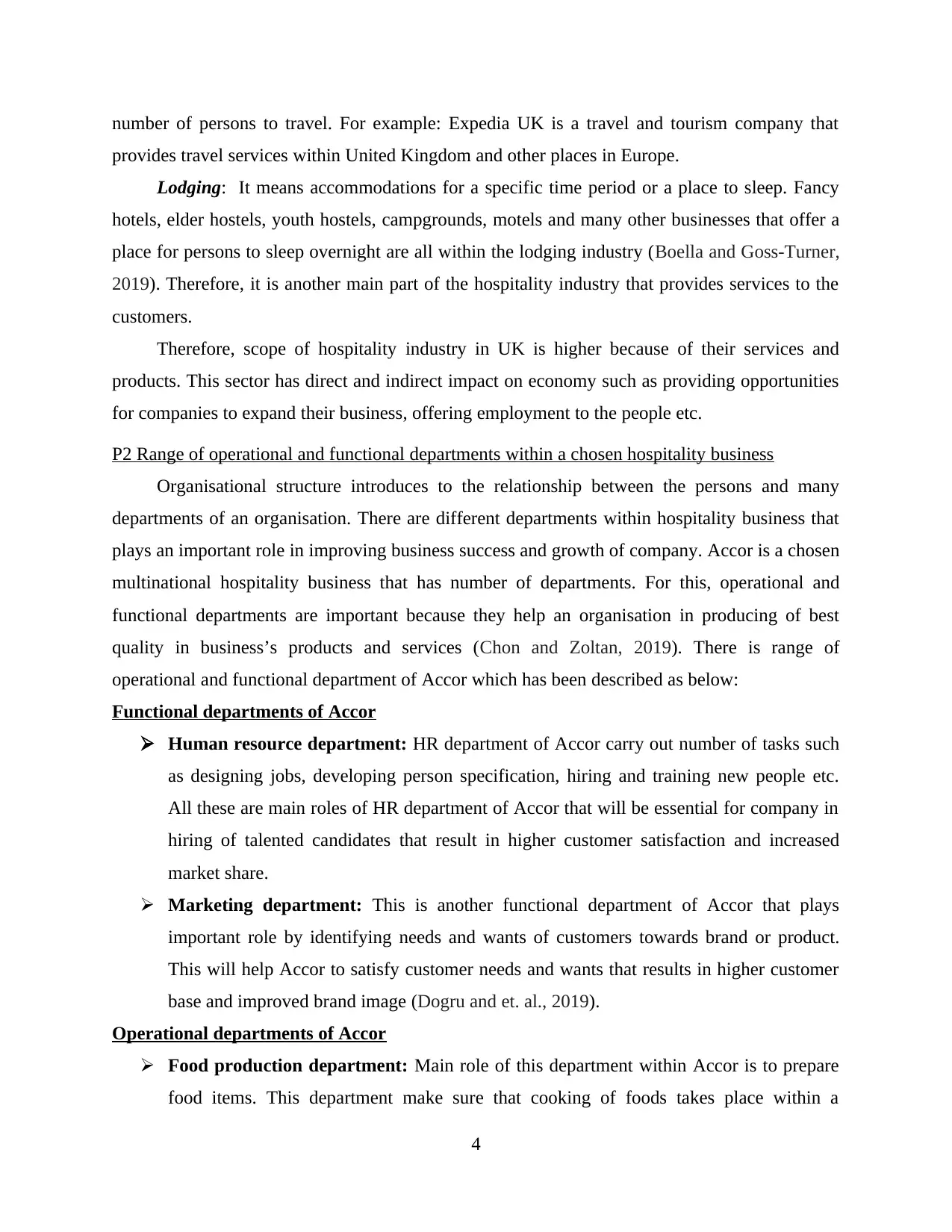
number of persons to travel. For example: Expedia UK is a travel and tourism company that
provides travel services within United Kingdom and other places in Europe.
Lodging: It means accommodations for a specific time period or a place to sleep. Fancy
hotels, elder hostels, youth hostels, campgrounds, motels and many other businesses that offer a
place for persons to sleep overnight are all within the lodging industry (Boella and Goss-Turner,
2019). Therefore, it is another main part of the hospitality industry that provides services to the
customers.
Therefore, scope of hospitality industry in UK is higher because of their services and
products. This sector has direct and indirect impact on economy such as providing opportunities
for companies to expand their business, offering employment to the people etc.
P2 Range of operational and functional departments within a chosen hospitality business
Organisational structure introduces to the relationship between the persons and many
departments of an organisation. There are different departments within hospitality business that
plays an important role in improving business success and growth of company. Accor is a chosen
multinational hospitality business that has number of departments. For this, operational and
functional departments are important because they help an organisation in producing of best
quality in business’s products and services (Chon and Zoltan, 2019). There is range of
operational and functional department of Accor which has been described as below:
Functional departments of Accor
Human resource department: HR department of Accor carry out number of tasks such
as designing jobs, developing person specification, hiring and training new people etc.
All these are main roles of HR department of Accor that will be essential for company in
hiring of talented candidates that result in higher customer satisfaction and increased
market share.
Marketing department: This is another functional department of Accor that plays
important role by identifying needs and wants of customers towards brand or product.
This will help Accor to satisfy customer needs and wants that results in higher customer
base and improved brand image (Dogru and et. al., 2019).
Operational departments of Accor
Food production department: Main role of this department within Accor is to prepare
food items. This department make sure that cooking of foods takes place within a
4
provides travel services within United Kingdom and other places in Europe.
Lodging: It means accommodations for a specific time period or a place to sleep. Fancy
hotels, elder hostels, youth hostels, campgrounds, motels and many other businesses that offer a
place for persons to sleep overnight are all within the lodging industry (Boella and Goss-Turner,
2019). Therefore, it is another main part of the hospitality industry that provides services to the
customers.
Therefore, scope of hospitality industry in UK is higher because of their services and
products. This sector has direct and indirect impact on economy such as providing opportunities
for companies to expand their business, offering employment to the people etc.
P2 Range of operational and functional departments within a chosen hospitality business
Organisational structure introduces to the relationship between the persons and many
departments of an organisation. There are different departments within hospitality business that
plays an important role in improving business success and growth of company. Accor is a chosen
multinational hospitality business that has number of departments. For this, operational and
functional departments are important because they help an organisation in producing of best
quality in business’s products and services (Chon and Zoltan, 2019). There is range of
operational and functional department of Accor which has been described as below:
Functional departments of Accor
Human resource department: HR department of Accor carry out number of tasks such
as designing jobs, developing person specification, hiring and training new people etc.
All these are main roles of HR department of Accor that will be essential for company in
hiring of talented candidates that result in higher customer satisfaction and increased
market share.
Marketing department: This is another functional department of Accor that plays
important role by identifying needs and wants of customers towards brand or product.
This will help Accor to satisfy customer needs and wants that results in higher customer
base and improved brand image (Dogru and et. al., 2019).
Operational departments of Accor
Food production department: Main role of this department within Accor is to prepare
food items. This department make sure that cooking of foods takes place within a
4
Paraphrase This Document
Need a fresh take? Get an instant paraphrase of this document with our AI Paraphraser
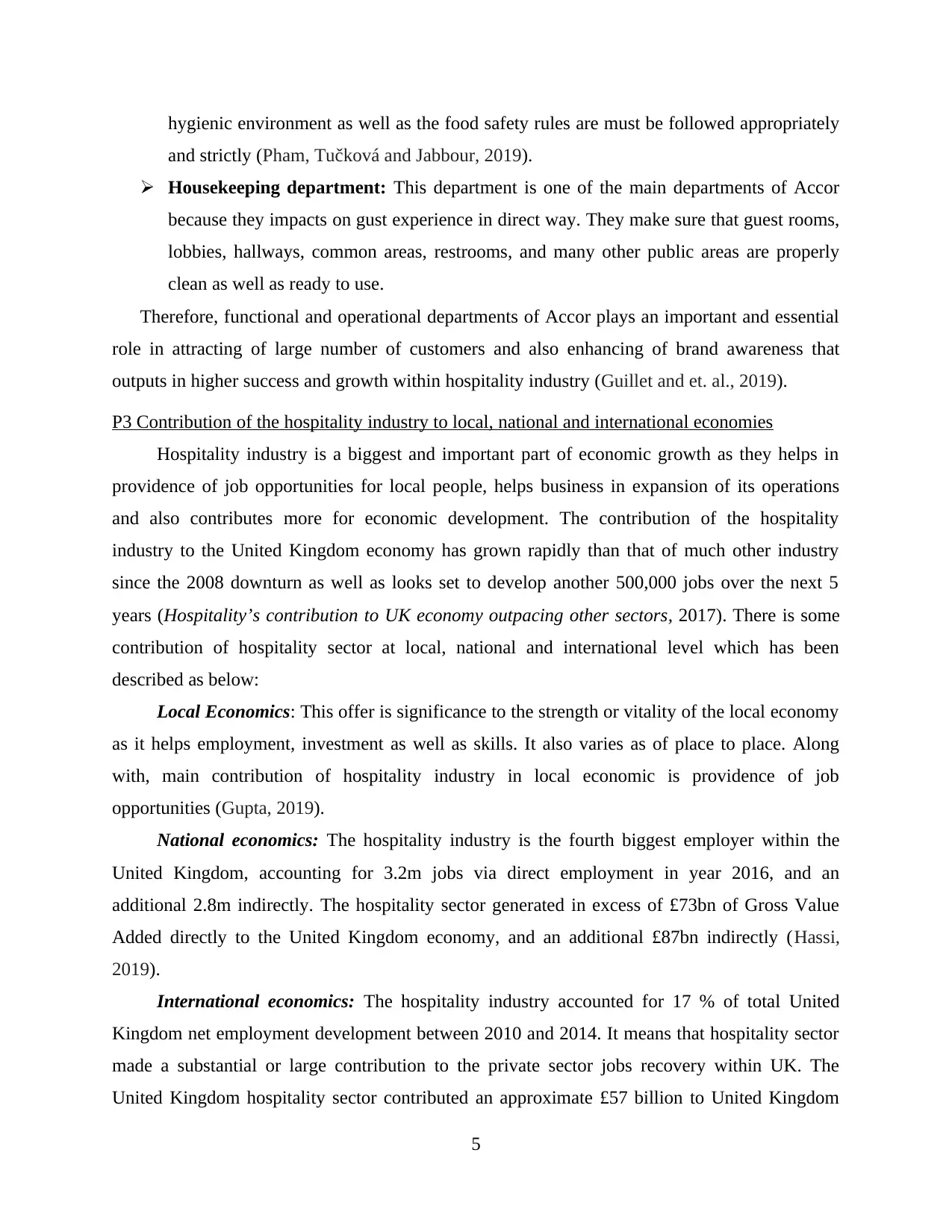
hygienic environment as well as the food safety rules are must be followed appropriately
and strictly (Pham, Tučková and Jabbour, 2019).
Housekeeping department: This department is one of the main departments of Accor
because they impacts on gust experience in direct way. They make sure that guest rooms,
lobbies, hallways, common areas, restrooms, and many other public areas are properly
clean as well as ready to use.
Therefore, functional and operational departments of Accor plays an important and essential
role in attracting of large number of customers and also enhancing of brand awareness that
outputs in higher success and growth within hospitality industry (Guillet and et. al., 2019).
P3 Contribution of the hospitality industry to local, national and international economies
Hospitality industry is a biggest and important part of economic growth as they helps in
providence of job opportunities for local people, helps business in expansion of its operations
and also contributes more for economic development. The contribution of the hospitality
industry to the United Kingdom economy has grown rapidly than that of much other industry
since the 2008 downturn as well as looks set to develop another 500,000 jobs over the next 5
years (Hospitality’s contribution to UK economy outpacing other sectors, 2017). There is some
contribution of hospitality sector at local, national and international level which has been
described as below:
Local Economics: This offer is significance to the strength or vitality of the local economy
as it helps employment, investment as well as skills. It also varies as of place to place. Along
with, main contribution of hospitality industry in local economic is providence of job
opportunities (Gupta, 2019).
National economics: The hospitality industry is the fourth biggest employer within the
United Kingdom, accounting for 3.2m jobs via direct employment in year 2016, and an
additional 2.8m indirectly. The hospitality sector generated in excess of £73bn of Gross Value
Added directly to the United Kingdom economy, and an additional £87bn indirectly (Hassi,
2019).
International economics: The hospitality industry accounted for 17 % of total United
Kingdom net employment development between 2010 and 2014. It means that hospitality sector
made a substantial or large contribution to the private sector jobs recovery within UK. The
United Kingdom hospitality sector contributed an approximate £57 billion to United Kingdom
5
and strictly (Pham, Tučková and Jabbour, 2019).
Housekeeping department: This department is one of the main departments of Accor
because they impacts on gust experience in direct way. They make sure that guest rooms,
lobbies, hallways, common areas, restrooms, and many other public areas are properly
clean as well as ready to use.
Therefore, functional and operational departments of Accor plays an important and essential
role in attracting of large number of customers and also enhancing of brand awareness that
outputs in higher success and growth within hospitality industry (Guillet and et. al., 2019).
P3 Contribution of the hospitality industry to local, national and international economies
Hospitality industry is a biggest and important part of economic growth as they helps in
providence of job opportunities for local people, helps business in expansion of its operations
and also contributes more for economic development. The contribution of the hospitality
industry to the United Kingdom economy has grown rapidly than that of much other industry
since the 2008 downturn as well as looks set to develop another 500,000 jobs over the next 5
years (Hospitality’s contribution to UK economy outpacing other sectors, 2017). There is some
contribution of hospitality sector at local, national and international level which has been
described as below:
Local Economics: This offer is significance to the strength or vitality of the local economy
as it helps employment, investment as well as skills. It also varies as of place to place. Along
with, main contribution of hospitality industry in local economic is providence of job
opportunities (Gupta, 2019).
National economics: The hospitality industry is the fourth biggest employer within the
United Kingdom, accounting for 3.2m jobs via direct employment in year 2016, and an
additional 2.8m indirectly. The hospitality sector generated in excess of £73bn of Gross Value
Added directly to the United Kingdom economy, and an additional £87bn indirectly (Hassi,
2019).
International economics: The hospitality industry accounted for 17 % of total United
Kingdom net employment development between 2010 and 2014. It means that hospitality sector
made a substantial or large contribution to the private sector jobs recovery within UK. The
United Kingdom hospitality sector contributed an approximate £57 billion to United Kingdom
5
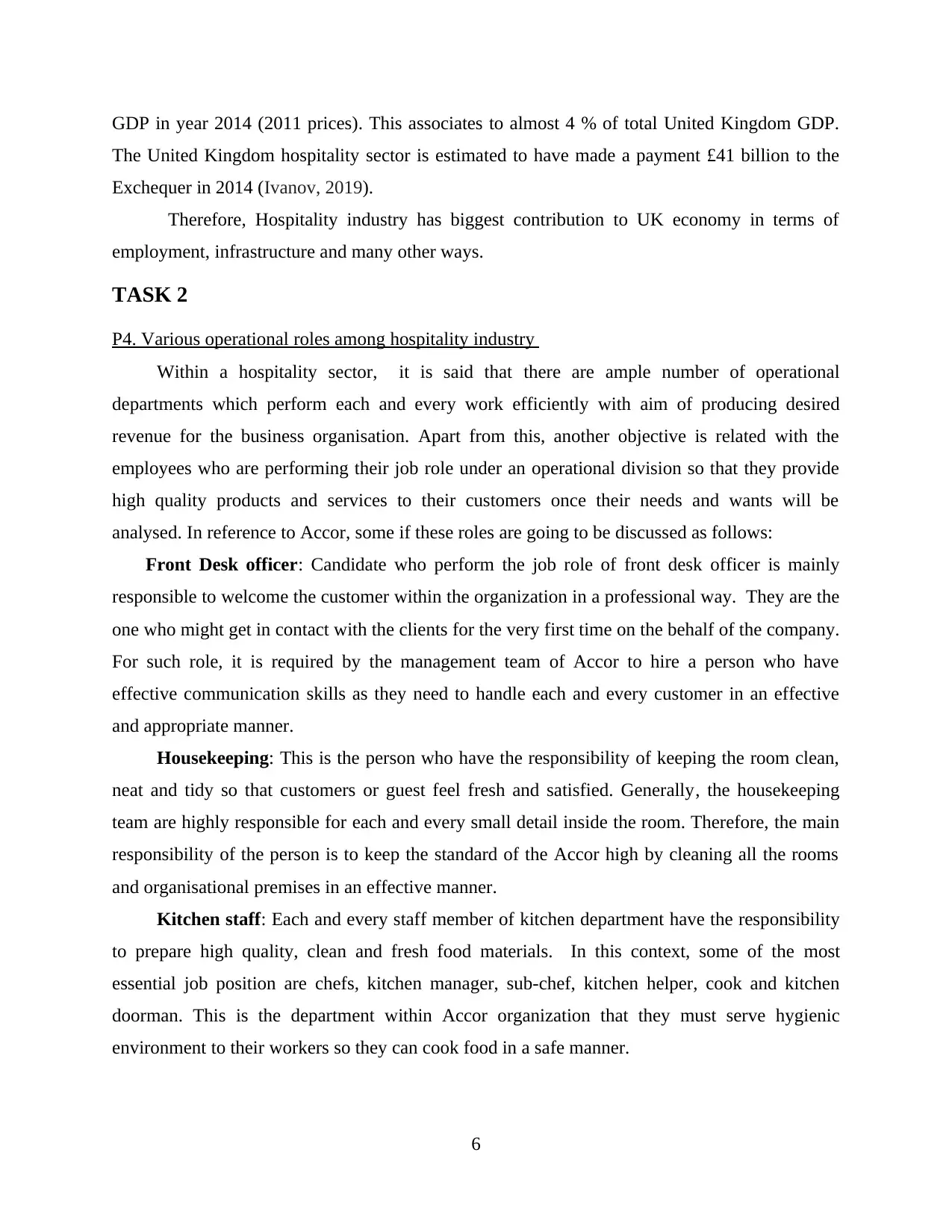
GDP in year 2014 (2011 prices). This associates to almost 4 % of total United Kingdom GDP.
The United Kingdom hospitality sector is estimated to have made a payment £41 billion to the
Exchequer in 2014 (Ivanov, 2019).
Therefore, Hospitality industry has biggest contribution to UK economy in terms of
employment, infrastructure and many other ways.
TASK 2
P4. Various operational roles among hospitality industry
Within a hospitality sector, it is said that there are ample number of operational
departments which perform each and every work efficiently with aim of producing desired
revenue for the business organisation. Apart from this, another objective is related with the
employees who are performing their job role under an operational division so that they provide
high quality products and services to their customers once their needs and wants will be
analysed. In reference to Accor, some if these roles are going to be discussed as follows:
Front Desk officer: Candidate who perform the job role of front desk officer is mainly
responsible to welcome the customer within the organization in a professional way. They are the
one who might get in contact with the clients for the very first time on the behalf of the company.
For such role, it is required by the management team of Accor to hire a person who have
effective communication skills as they need to handle each and every customer in an effective
and appropriate manner.
Housekeeping: This is the person who have the responsibility of keeping the room clean,
neat and tidy so that customers or guest feel fresh and satisfied. Generally, the housekeeping
team are highly responsible for each and every small detail inside the room. Therefore, the main
responsibility of the person is to keep the standard of the Accor high by cleaning all the rooms
and organisational premises in an effective manner.
Kitchen staff: Each and every staff member of kitchen department have the responsibility
to prepare high quality, clean and fresh food materials. In this context, some of the most
essential job position are chefs, kitchen manager, sub-chef, kitchen helper, cook and kitchen
doorman. This is the department within Accor organization that they must serve hygienic
environment to their workers so they can cook food in a safe manner.
6
The United Kingdom hospitality sector is estimated to have made a payment £41 billion to the
Exchequer in 2014 (Ivanov, 2019).
Therefore, Hospitality industry has biggest contribution to UK economy in terms of
employment, infrastructure and many other ways.
TASK 2
P4. Various operational roles among hospitality industry
Within a hospitality sector, it is said that there are ample number of operational
departments which perform each and every work efficiently with aim of producing desired
revenue for the business organisation. Apart from this, another objective is related with the
employees who are performing their job role under an operational division so that they provide
high quality products and services to their customers once their needs and wants will be
analysed. In reference to Accor, some if these roles are going to be discussed as follows:
Front Desk officer: Candidate who perform the job role of front desk officer is mainly
responsible to welcome the customer within the organization in a professional way. They are the
one who might get in contact with the clients for the very first time on the behalf of the company.
For such role, it is required by the management team of Accor to hire a person who have
effective communication skills as they need to handle each and every customer in an effective
and appropriate manner.
Housekeeping: This is the person who have the responsibility of keeping the room clean,
neat and tidy so that customers or guest feel fresh and satisfied. Generally, the housekeeping
team are highly responsible for each and every small detail inside the room. Therefore, the main
responsibility of the person is to keep the standard of the Accor high by cleaning all the rooms
and organisational premises in an effective manner.
Kitchen staff: Each and every staff member of kitchen department have the responsibility
to prepare high quality, clean and fresh food materials. In this context, some of the most
essential job position are chefs, kitchen manager, sub-chef, kitchen helper, cook and kitchen
doorman. This is the department within Accor organization that they must serve hygienic
environment to their workers so they can cook food in a safe manner.
6
⊘ This is a preview!⊘
Do you want full access?
Subscribe today to unlock all pages.

Trusted by 1+ million students worldwide
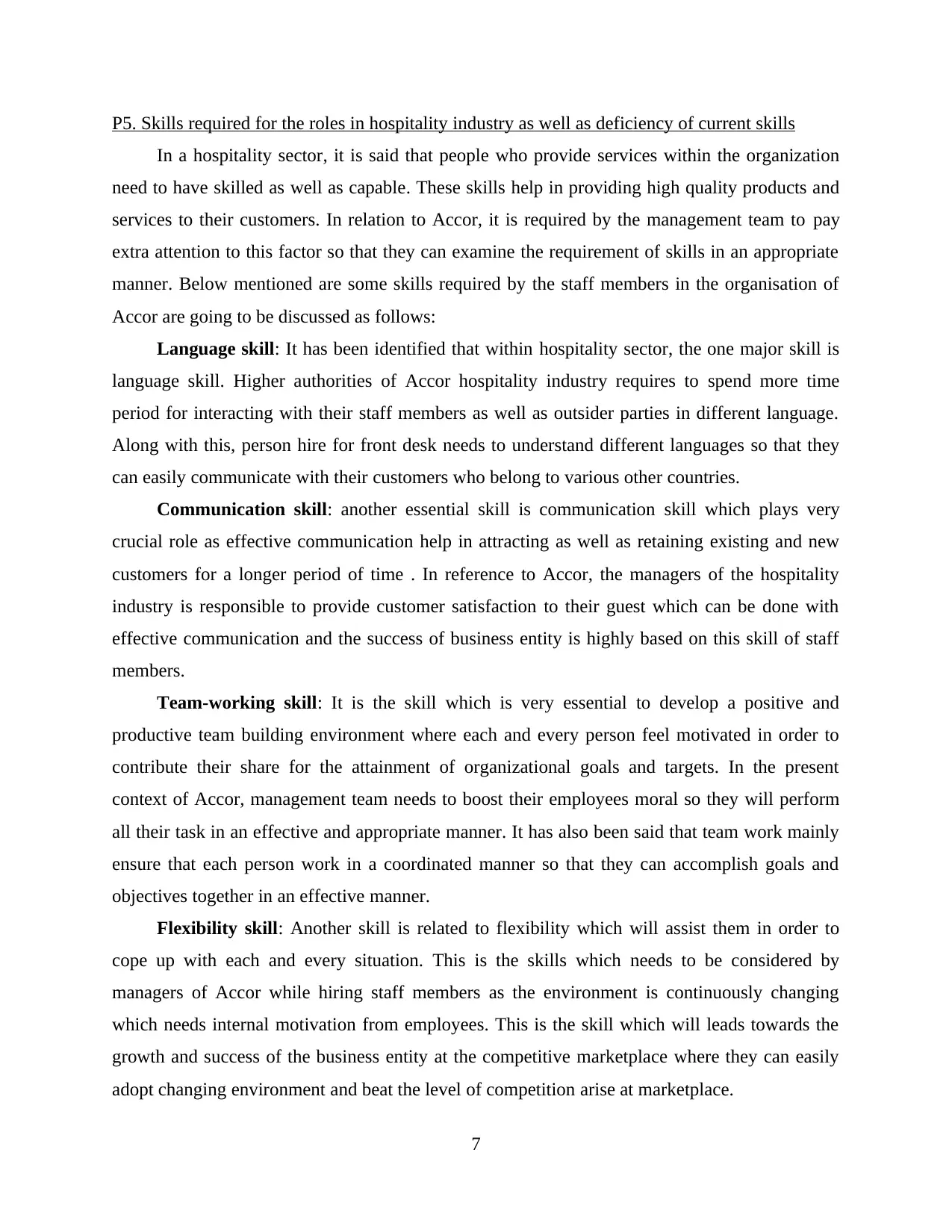
P5. Skills required for the roles in hospitality industry as well as deficiency of current skills
In a hospitality sector, it is said that people who provide services within the organization
need to have skilled as well as capable. These skills help in providing high quality products and
services to their customers. In relation to Accor, it is required by the management team to pay
extra attention to this factor so that they can examine the requirement of skills in an appropriate
manner. Below mentioned are some skills required by the staff members in the organisation of
Accor are going to be discussed as follows:
Language skill: It has been identified that within hospitality sector, the one major skill is
language skill. Higher authorities of Accor hospitality industry requires to spend more time
period for interacting with their staff members as well as outsider parties in different language.
Along with this, person hire for front desk needs to understand different languages so that they
can easily communicate with their customers who belong to various other countries.
Communication skill: another essential skill is communication skill which plays very
crucial role as effective communication help in attracting as well as retaining existing and new
customers for a longer period of time . In reference to Accor, the managers of the hospitality
industry is responsible to provide customer satisfaction to their guest which can be done with
effective communication and the success of business entity is highly based on this skill of staff
members.
Team-working skill: It is the skill which is very essential to develop a positive and
productive team building environment where each and every person feel motivated in order to
contribute their share for the attainment of organizational goals and targets. In the present
context of Accor, management team needs to boost their employees moral so they will perform
all their task in an effective and appropriate manner. It has also been said that team work mainly
ensure that each person work in a coordinated manner so that they can accomplish goals and
objectives together in an effective manner.
Flexibility skill: Another skill is related to flexibility which will assist them in order to
cope up with each and every situation. This is the skills which needs to be considered by
managers of Accor while hiring staff members as the environment is continuously changing
which needs internal motivation from employees. This is the skill which will leads towards the
growth and success of the business entity at the competitive marketplace where they can easily
adopt changing environment and beat the level of competition arise at marketplace.
7
In a hospitality sector, it is said that people who provide services within the organization
need to have skilled as well as capable. These skills help in providing high quality products and
services to their customers. In relation to Accor, it is required by the management team to pay
extra attention to this factor so that they can examine the requirement of skills in an appropriate
manner. Below mentioned are some skills required by the staff members in the organisation of
Accor are going to be discussed as follows:
Language skill: It has been identified that within hospitality sector, the one major skill is
language skill. Higher authorities of Accor hospitality industry requires to spend more time
period for interacting with their staff members as well as outsider parties in different language.
Along with this, person hire for front desk needs to understand different languages so that they
can easily communicate with their customers who belong to various other countries.
Communication skill: another essential skill is communication skill which plays very
crucial role as effective communication help in attracting as well as retaining existing and new
customers for a longer period of time . In reference to Accor, the managers of the hospitality
industry is responsible to provide customer satisfaction to their guest which can be done with
effective communication and the success of business entity is highly based on this skill of staff
members.
Team-working skill: It is the skill which is very essential to develop a positive and
productive team building environment where each and every person feel motivated in order to
contribute their share for the attainment of organizational goals and targets. In the present
context of Accor, management team needs to boost their employees moral so they will perform
all their task in an effective and appropriate manner. It has also been said that team work mainly
ensure that each person work in a coordinated manner so that they can accomplish goals and
objectives together in an effective manner.
Flexibility skill: Another skill is related to flexibility which will assist them in order to
cope up with each and every situation. This is the skills which needs to be considered by
managers of Accor while hiring staff members as the environment is continuously changing
which needs internal motivation from employees. This is the skill which will leads towards the
growth and success of the business entity at the competitive marketplace where they can easily
adopt changing environment and beat the level of competition arise at marketplace.
7
Paraphrase This Document
Need a fresh take? Get an instant paraphrase of this document with our AI Paraphraser
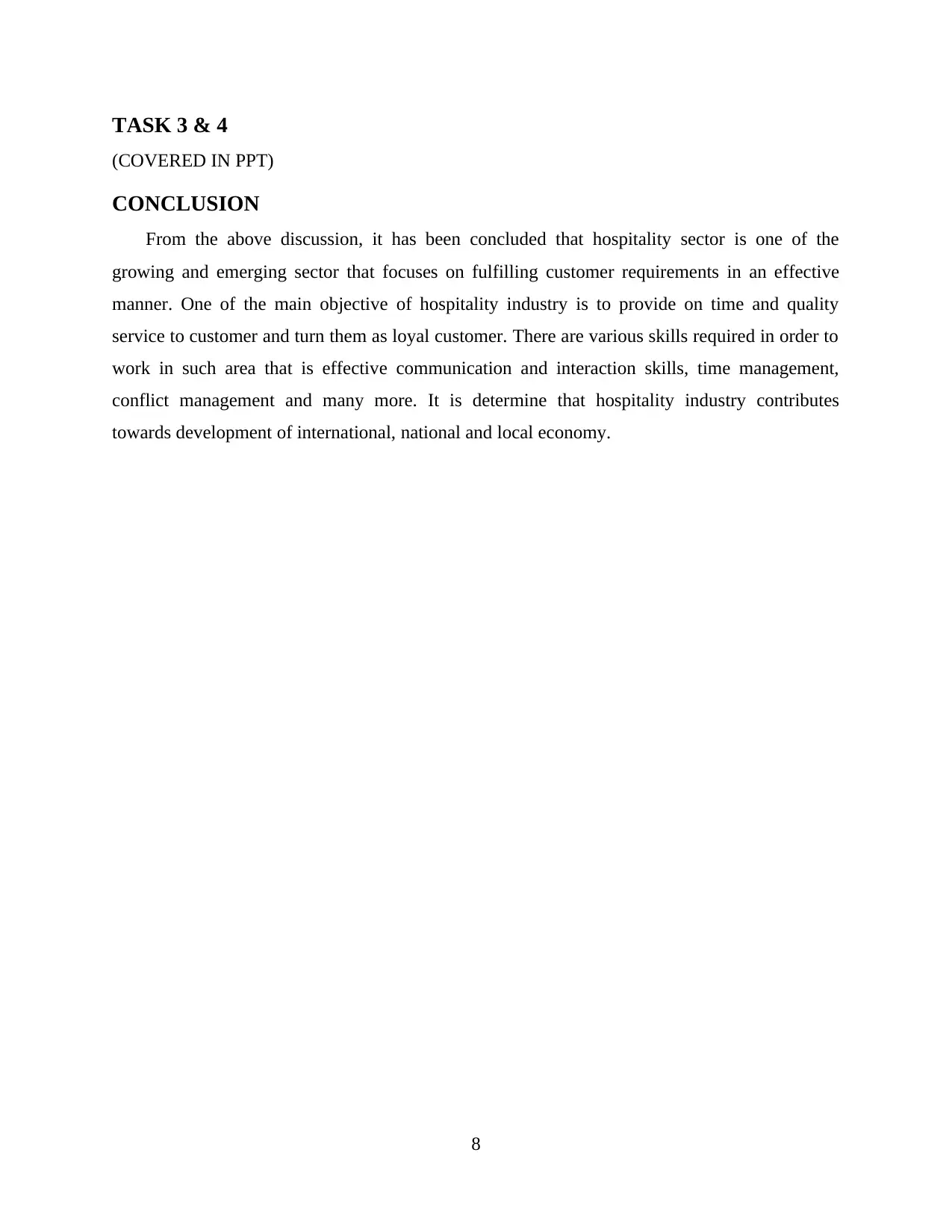
TASK 3 & 4
(COVERED IN PPT)
CONCLUSION
From the above discussion, it has been concluded that hospitality sector is one of the
growing and emerging sector that focuses on fulfilling customer requirements in an effective
manner. One of the main objective of hospitality industry is to provide on time and quality
service to customer and turn them as loyal customer. There are various skills required in order to
work in such area that is effective communication and interaction skills, time management,
conflict management and many more. It is determine that hospitality industry contributes
towards development of international, national and local economy.
8
(COVERED IN PPT)
CONCLUSION
From the above discussion, it has been concluded that hospitality sector is one of the
growing and emerging sector that focuses on fulfilling customer requirements in an effective
manner. One of the main objective of hospitality industry is to provide on time and quality
service to customer and turn them as loyal customer. There are various skills required in order to
work in such area that is effective communication and interaction skills, time management,
conflict management and many more. It is determine that hospitality industry contributes
towards development of international, national and local economy.
8
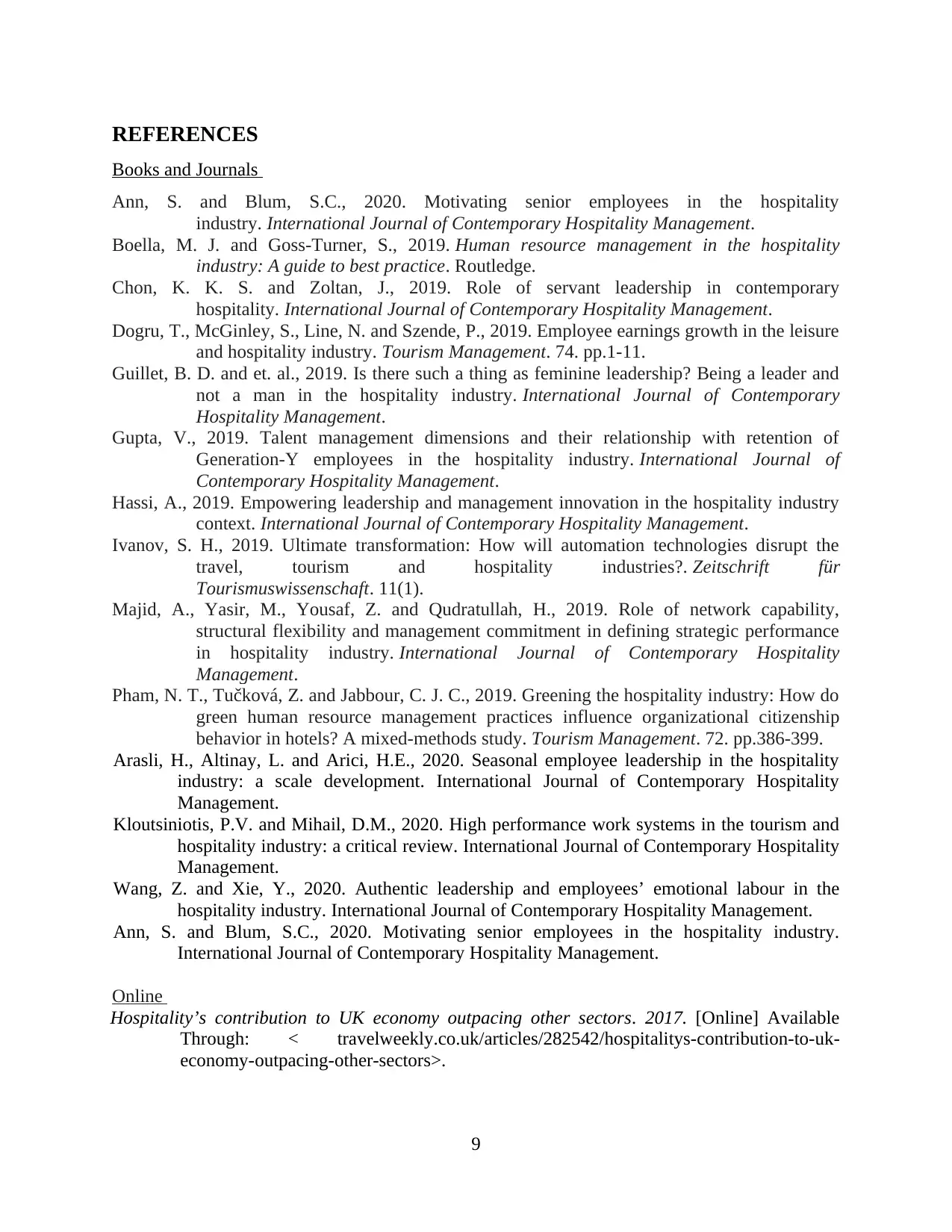
REFERENCES
Books and Journals
Ann, S. and Blum, S.C., 2020. Motivating senior employees in the hospitality
industry. International Journal of Contemporary Hospitality Management.
Boella, M. J. and Goss-Turner, S., 2019. Human resource management in the hospitality
industry: A guide to best practice. Routledge.
Chon, K. K. S. and Zoltan, J., 2019. Role of servant leadership in contemporary
hospitality. International Journal of Contemporary Hospitality Management.
Dogru, T., McGinley, S., Line, N. and Szende, P., 2019. Employee earnings growth in the leisure
and hospitality industry. Tourism Management. 74. pp.1-11.
Guillet, B. D. and et. al., 2019. Is there such a thing as feminine leadership? Being a leader and
not a man in the hospitality industry. International Journal of Contemporary
Hospitality Management.
Gupta, V., 2019. Talent management dimensions and their relationship with retention of
Generation-Y employees in the hospitality industry. International Journal of
Contemporary Hospitality Management.
Hassi, A., 2019. Empowering leadership and management innovation in the hospitality industry
context. International Journal of Contemporary Hospitality Management.
Ivanov, S. H., 2019. Ultimate transformation: How will automation technologies disrupt the
travel, tourism and hospitality industries?. Zeitschrift für
Tourismuswissenschaft. 11(1).
Majid, A., Yasir, M., Yousaf, Z. and Qudratullah, H., 2019. Role of network capability,
structural flexibility and management commitment in defining strategic performance
in hospitality industry. International Journal of Contemporary Hospitality
Management.
Pham, N. T., Tučková, Z. and Jabbour, C. J. C., 2019. Greening the hospitality industry: How do
green human resource management practices influence organizational citizenship
behavior in hotels? A mixed-methods study. Tourism Management. 72. pp.386-399.
Arasli, H., Altinay, L. and Arici, H.E., 2020. Seasonal employee leadership in the hospitality
industry: a scale development. International Journal of Contemporary Hospitality
Management.
Kloutsiniotis, P.V. and Mihail, D.M., 2020. High performance work systems in the tourism and
hospitality industry: a critical review. International Journal of Contemporary Hospitality
Management.
Wang, Z. and Xie, Y., 2020. Authentic leadership and employees’ emotional labour in the
hospitality industry. International Journal of Contemporary Hospitality Management.
Ann, S. and Blum, S.C., 2020. Motivating senior employees in the hospitality industry.
International Journal of Contemporary Hospitality Management.
Online
Hospitality’s contribution to UK economy outpacing other sectors. 2017. [Online] Available
Through: < travelweekly.co.uk/articles/282542/hospitalitys-contribution-to-uk-
economy-outpacing-other-sectors>.
9
Books and Journals
Ann, S. and Blum, S.C., 2020. Motivating senior employees in the hospitality
industry. International Journal of Contemporary Hospitality Management.
Boella, M. J. and Goss-Turner, S., 2019. Human resource management in the hospitality
industry: A guide to best practice. Routledge.
Chon, K. K. S. and Zoltan, J., 2019. Role of servant leadership in contemporary
hospitality. International Journal of Contemporary Hospitality Management.
Dogru, T., McGinley, S., Line, N. and Szende, P., 2019. Employee earnings growth in the leisure
and hospitality industry. Tourism Management. 74. pp.1-11.
Guillet, B. D. and et. al., 2019. Is there such a thing as feminine leadership? Being a leader and
not a man in the hospitality industry. International Journal of Contemporary
Hospitality Management.
Gupta, V., 2019. Talent management dimensions and their relationship with retention of
Generation-Y employees in the hospitality industry. International Journal of
Contemporary Hospitality Management.
Hassi, A., 2019. Empowering leadership and management innovation in the hospitality industry
context. International Journal of Contemporary Hospitality Management.
Ivanov, S. H., 2019. Ultimate transformation: How will automation technologies disrupt the
travel, tourism and hospitality industries?. Zeitschrift für
Tourismuswissenschaft. 11(1).
Majid, A., Yasir, M., Yousaf, Z. and Qudratullah, H., 2019. Role of network capability,
structural flexibility and management commitment in defining strategic performance
in hospitality industry. International Journal of Contemporary Hospitality
Management.
Pham, N. T., Tučková, Z. and Jabbour, C. J. C., 2019. Greening the hospitality industry: How do
green human resource management practices influence organizational citizenship
behavior in hotels? A mixed-methods study. Tourism Management. 72. pp.386-399.
Arasli, H., Altinay, L. and Arici, H.E., 2020. Seasonal employee leadership in the hospitality
industry: a scale development. International Journal of Contemporary Hospitality
Management.
Kloutsiniotis, P.V. and Mihail, D.M., 2020. High performance work systems in the tourism and
hospitality industry: a critical review. International Journal of Contemporary Hospitality
Management.
Wang, Z. and Xie, Y., 2020. Authentic leadership and employees’ emotional labour in the
hospitality industry. International Journal of Contemporary Hospitality Management.
Ann, S. and Blum, S.C., 2020. Motivating senior employees in the hospitality industry.
International Journal of Contemporary Hospitality Management.
Online
Hospitality’s contribution to UK economy outpacing other sectors. 2017. [Online] Available
Through: < travelweekly.co.uk/articles/282542/hospitalitys-contribution-to-uk-
economy-outpacing-other-sectors>.
9
⊘ This is a preview!⊘
Do you want full access?
Subscribe today to unlock all pages.

Trusted by 1+ million students worldwide
1 out of 9
Related Documents
Your All-in-One AI-Powered Toolkit for Academic Success.
+13062052269
info@desklib.com
Available 24*7 on WhatsApp / Email
![[object Object]](/_next/static/media/star-bottom.7253800d.svg)
Unlock your academic potential
Copyright © 2020–2026 A2Z Services. All Rights Reserved. Developed and managed by ZUCOL.





